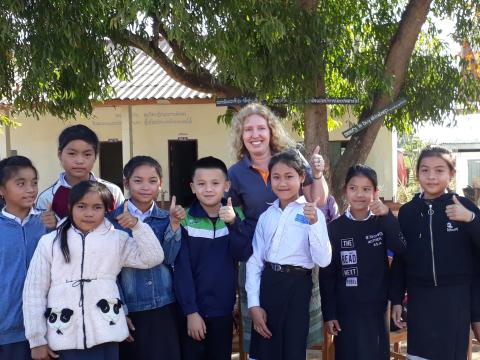Back to school: A new hope for Lao children

Vientiane - 22 November 2021
Over the weekend, the Universal Children’s Day was celebrated all over the world, commemorating the Declaration and Convention of the Rights of the Child adopted by the United Nations General Assembly many decades ago. It was a bitter-sweet celebration this year, falling in the midst of a global pandemic that has had strong and multi-aspect impacts on child well-being. In Lao PDR, it has now been over 200 days that many classrooms have been quiet from lively chatter, with children staying away from schools, their primary source of education.
In 2021, COVID-19 has definitely aggravated an already fragile situation, especially for the most vulnerable children living in rural areas. Earlier this year, World Vision’s Asia Pacific office conducted research on the impact of COVID-19[1] on health, education, livelihoods, food security, and child protection and well-being. In Laos, over 1,500 individuals participated in the household and child surveys, mainly from rural areas where World Vision operates. The research indicated some concerning trends occurring in Laos and key findings and recommendations are available through the Unmasking II – Childhood Lost – Laos report. Some areas of concern I would like to highlight include:
- Between March-May 2021, prior to majority of schools closing, 31% of children surveyed were not attending class in-person. While 13% reported this was due to school closure, concerningly 17% reported other reasons, such as being sent to work, lack of monetary resources or desire to stay at home;
- Only 18% children surveyed had regular access to an internet connection, and only 2% were able to access online education materials;
- 1 in 6 children reported they experienced feeling hopeless for their future,
- 80% of children surveyed were engaged in economic activities, including 16% of them exposed to hazardous labor,
- 1 in 7 parents indicated they were concerned their child would marry early or fall pregnant.
© World Vision International – The new Unmasking II: Childhood Lost surveyed close to 5,500 children
across nine countries in Asia between March and June 2021.
The flow on effects of the pandemic are clearly being felt by children across Laos and school closures are another catalyzer for violence against children and accelerators of child-labour and child-marriage. There is urgent need for a multi-layered, multi-stakeholder approach to address child well-being issues, including the integration of mental health components into health services for both children and adults.
We understand the Government is aware of these challenges and are encouraged by the steps being taken to address them. I am are more than delighted to sense that children will soon be back in their classrooms, and acknowledge the efforts being made by the Government to ensure schools re-open well, that they operate in good condition, and children and teacher safety is a top priority. Civil Society Organizations have a role to play in supporting the Government, UN agencies and all stakeholders involved, to ensure children are going back to safe schools, that girls are returning to school along with their male peers, and children can once again dream of a brighter future.
As we reflect on the new hope brought by the plans for school reopening, we mustn’t forget the remaining challenges that still need to be addressed. With COVID here to stay, we need to continue to find solutions to address the disparities and unequal access to quality learning to those in more remote communities of Laos, especially in areas with low digital capacities and low internet coverage. We encourage the Government to retain a focus on these most marginalised children, with strong social equity inclusion, leaving no one behind. To direct resources to reduce rural-urban, ethnic, age, gender, and disability inequalities; ensuring access to quality health, education, and protection services by minimising the risk that cut of budget due to the impacts of COVID-19 can have on Lao’s future generations.
Nothing can replace the atmosphere of a classroom, the whispers between pupils, and the caring guidance of a physically present teacher. Children are the future, putting them at risk of lifelong impairment due to increased mental stress and reduced access to education will create setbacks in achieving the bright future that is planned for this beautiful country.
[1] Unmasking II Childhood Lost report – World Vision Asia Pacific: https://bit.ly/30vbpAO